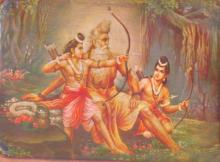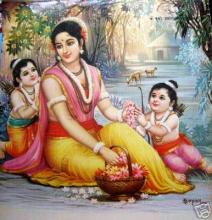Rāma’s messengers quickly conveyed the message to Sage Vālmīki. The maharṣi said, “So be it! A husband is a wife’s divinity. Sītā will act in a way that Rāghava is satisfied.” Rāma was happy to hear the maharṣi’s message. He declared that Sītā’s śapatha – test of purity would take place the next day and those interested in witnessing it may assemble.
Author:hari
सनातन धर्म अगणित समस्याओं के श्रेष्ठ निदानों का अनमोल खजाना है। उदाहरण के लिए ‘संकल्प’ पर विचार करें जिसे हम अपने दैनिक पूजा पद्धति की एक क्रिया के रुप में करते हैं। इसमें हम वर्तमान दिन के साथसाथ ब्रह्माण्डिय काल को स्वीकारते है, अपने निवास स्थल के साथ साथ हम ब्रह्माण्डिय देश को भी स्वीकारते है। हम कहते है “शुभे शोभने मुहूर्ते आद्य-ब्रह्मणः द्वितिया-परार्धे” से लगा कर ‘कर्मकाण्ड़ करने के दिन तक। उसी प्रकार ब्रह्माण्ड से प्रारम्भ कर ‘जम्बूद्वीपे भारतवर्षे भरतखण्डे गोदावर्याः दक्षिणे तीरे’ तक हम दिक् का स्मरण करते हैं। इसमें एक व्यक्ति अपनी स्थिति और विशिष्ट समय
Having now reflected upon the steps to attain the right level of eligibility, let us think once again about the four problems due to changing times.
Jinasena, the author of Pūrvapurāṇa, hailed from Karnataka. He composed this work in an age when the central tenets of literary aesthetics were taking shape, and so his observations merit close study. Let us examine a few relevant verses from Pūrvapurāṇa.
Jinasena held that poetry is a vehicle of religion. The foremost aim of poetry, according to him, is the dissemination of dharma:
त एव कवयो लोके त एव च विचक्षणाः।
Lakṣmaṇa described to Rāma the glory of the aśvamedha and narrated the story of Indra vanquishing Vṛtrāsura. Upon performing the aśvamedha to Bhagavān Viṣṇu, Indra got rid of his fear of brahmahatyā doṣa, which he had acquired upon killing the rākṣasa. Brahmahatyā then took residence in four different places – first, as froth in rivers; second, as latex in trees; third, as menstrual blood in youthful women; and fourth, in those who kill the brāhmaṇas.
चाणक्य कोई धर्मान्ध व्यक्ति नहीं था। वह स्वयं आसानी से सिंहासन पर बैठ सकता था जैसा कि उन दिनों ब्राह्मणों का राजा बनना प्रचलन में था। मौर्य साम्राज्य के पतन के बाद पुष्यमित्र शुंग और उसके वंशज शासक बने और उनके उपरांत काण्व लोगों ने राज किया। यह सभी ब्राह्मण थे। चाणक्य ने पद प्रतिष्ठा की कभी परवाह नही की। उसका दूरदृष्टि पूर्ण लक्ष्य ब्राह्म और क्षात्र के समन्वय द्वारा देशवासियों के कल्याण के सुनिश्चित करना था।
What about the jñānī? He too has to perform karma but instructing him is not necessary. He performs karma without any guidance. Karma is imperative as long as the body exists. Life in the physical plane implies contact with the world. Even the most knowledgeable cannot escape it. If that is the case, what is so unique about a jñānī’s knowledge? The answer is that a jñānī’s karma does not result in individual results for him.
Lakṣmaṇa, whose mind was distressed after dropping off Sītā on the banks of the river Gaṅgā, watched her being taken into the āśrama. He told his counsellor and charioteer Sumantra, “Just imagine how much pain Rāma might be experiencing on account of Sītā’s agony. Can there be any greater suffering for Rāghava after he has sent away Janaka’s daughter of flawless character? It is evident that this separation of Rāma from Sītā is a play of the daiva – fate.
जितनी स्वतंत्रता की आवश्यकता है उतनी ही आवश्यकता हमें संयम और आत्मानुशासन की भी है। जब हम नियंत्रणों का सम्मान करना जान लेंगे तब ही हमे अधिकार और सुविधाएँ प्राप्त हो सकती है। निरंकुश स्वतंत्रता, अनियंत्रित इच्छाविलास, मनमौजी सनक लम्बेसमय तक उपयोगी सिद्ध नही हो सकती है। इसका अनुभव हम भारत पर सिकंदर के आक्रमण के प्रसंग में देख चुके हैं। पौरव (ग्रीक वर्णनानुसार पोरस) सिकंदर से हार गया था। ऐसा कहा जाता है कि पौरव एक गणतंत्र का अधिपति था यद्यपि इसमें कुछ अनिश्चितता है। ऐसी कहानियॉ है कि सिकंदर ने उसके साथ मित्रवत व्यवहार किया था। ग्रीक वर्णन पर कितना भरोसा किया जाय य









